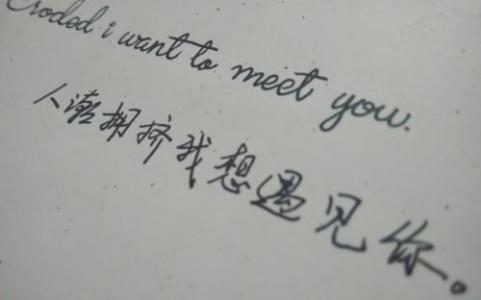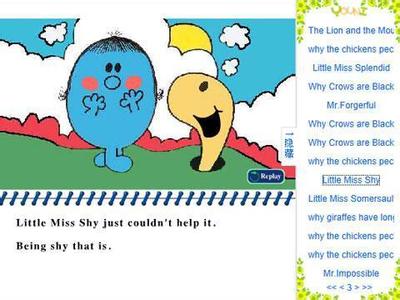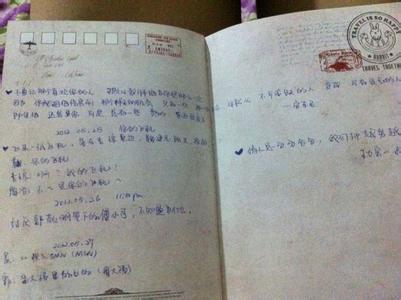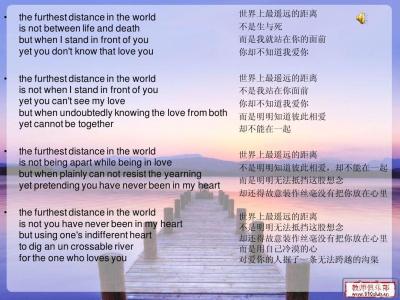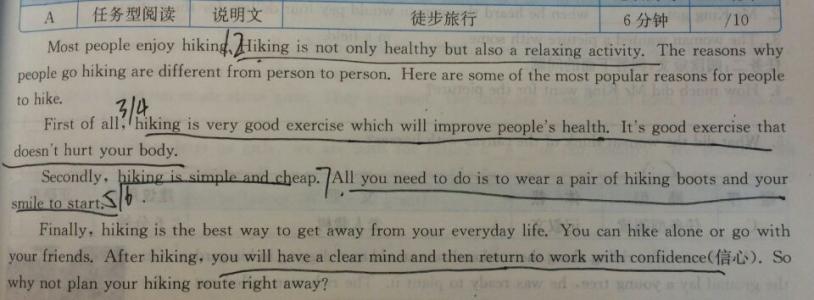
英语段落常见的模式是一般 -具体型 ,即通常以话题陈述句开始 ,后面跟有若干分述部分。小编整理了关于简单优美的英语段落,欢迎阅读!
关于简单优美的英语段落一
I was happy to be home. But then I noticed that Penelope,who was staying with us,was wearing my clothes. And my family seemed to like her better than me. I wondered if I would be missed if I weren’t there. I told my mom, and she explained that though Penelope was a lovely girl, no one could replace me. I pointed out,” She is more patient and is neater than I have ever been.” My mom said these were wonderful qualities, but I was the only person who could fill my role. She made me realize that even with my faults—and there were many-I was a loved member of the family who couldn’t be replaced.
我很高兴能回到家,但不久我注意到和我们一起的佩内洛普穿着我的衣服,而且我父母看上去更喜欢她,我想知道如果我不在家的话他们是否会想念我。后来,我把我的想法告诉了母亲,她说尽管佩内洛普是个可爱的女孩,但她始终不能取代我,我说:“她比我有耐心而且无论何时看上去她都比我要整洁大方。”母亲说这些都是非常好的优点,但我却是惟一个能扮演好自己角色的人。母亲让我感到尽管我有缺点———似乎还很多———但是,我被家中每一个人爱着,谁也无法取代。
关于简单优美的英语段落二
It is a great truth because once we truly understand and accept it, Then life is no longer difficult.
一旦我们懂得并接受生活,生活便不再艰难。这是伟大的真理。
Most do not fully see this truth. Instead they complain about their problem and difficulties as if life should be easy. It seems to them that difficulties represent a special kind of suffering especially forced upon them or else upon their families, their class, or even their nation.
但是大多数人没有认识到这一点。他们只会抱怨遇到的问题和生活的艰难,好像生活本不该这么艰难。似乎困难就代表了一种强加于他们,或强加于他们的家人、阶级、民族的苦难。生活之所以如此艰难,是因为面对和解决问题的过程是一个痛苦的过程。生活中不同种类的问题会给我们带来悲伤、孤独、遗憾、愤怒与恐惧。那是一种令人不舒服的感觉,像身体的疼痛一样令人痛苦。由于生活中经常会有各种各样无穷无尽的问题,生活才显得艰难并充满痛苦与欢乐。
关于简单优美的英语段落三
For example, when Thomas A. Edison was trying to make an electric lamp, he needed a substance for the filament* inside the bulb that would glow brightly without burning up quickly. He tried more than a thousand different filaments before he found one that he could use. After each trial he thought about how the new substance had behaved. He kept notes and compared results. After he had experimented for a long time, someone asked Mr. Edison if he was ever discouraged by the time they thought he had wasted. He replied, "I have not been wasting time. I have just found a thousand materials that won’t work. Now I can look for others that will." Edison’s statement is important. Above all, scientists demand to know when and where they are wrong. A good question to ask in science is not, "Am I right? "but, "Am I wrong?"
例如,当托马斯·阿尔瓦·爱迪生在发明电灯过程中,他需要一种既能发出明亮的光又不会很快烧毁的材料来作灯泡里的灯丝。他尝试了一千多种不同的灯丝后才找到一种适合的材料。每一次尝试之后,他都在思索新的材料该如何发挥作用。他不断地记笔记,比较结果。经过很长时间的实验之后,有人问爱迪生,如此浪费时间他难道不感到沮丧?爱迪生回答说:"我并没有浪费时间。我已经找出有一千种材料不管用。现在我可以寻找其他材料了。"爱迪生的话非常重要。最重要的是,科学家应该知道他们是在何时、何处错了。在科学上,一个问得高明的问题并不是"我对不对?"而是"我错没错?"
 爱华网
爱华网